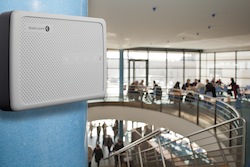Alcatel-Lucent has unveiled a new plan to boost metro small cell mobile network coverage by certifying some 600,000 locations on billboards, cable lines and street furniture in Europe and the US.
The initiative, dubbed the Metro Cell Express Site Certification Program, initially brings together nine providers designed to remove the challenges associated with site acquisition and backhaul.
Operators can select the providers, which include cable operators in the US, “a leading player” in the global outdoor advertising market, systems integrators, managed services providers, site acquisition specialty firms and OSP construction specialists, to speed up the deployment of metro small cells.
According to the France-based vendor, the partners are able to provide operators with access to 325,000 street assets, more than 150,000 serviceable on-net buildings, 30,000 rooftops and 10,000 fibre-to-the-building assets, amongst other sites.
“Wireless operators have embraced small cells as an essential part of their ultra-broadband wireless network, but they must adapt to the new challenges associated with building, operating, and maintaining these new small cell networks,” commented A-L’s VP of small cells Mike Schabel.
“While no company alone can address the 4P’s necessary for small cell deployment – people, power, poles and ports – the group working together creates tens of thousands of qualified and available small cell sites.”
The global adoption and deployment of small cell technology is increasingly rapidly. The Small Cell Forum says that as many as 11.5 million small cell base stations could be deployed by 2018, up from just 168,000 today.
However, operators are still facing challenges; Mobile Europe’s Small Cells Insight Report earlier this year found that backhaul remains the biggest challenge.
Ovum analyst Daryl Schoolar, Principal said that A-L’s programme is a good start to overcoming the challenges: “[The Certification Program] should save time when it comes to installing small cells… and should help accelerate the market’s growth.
“The obstacle here for A-L is scaling the programme. [A-L] will definitely need to add more geographic coverage and exponentially increase the number of sites.
“While being able to provide access to every site needed through the certification program is obviously unrealistic, A-L must be able to cover a significant portion of the needed sites via its certification program for it to be successful.”
Read more


